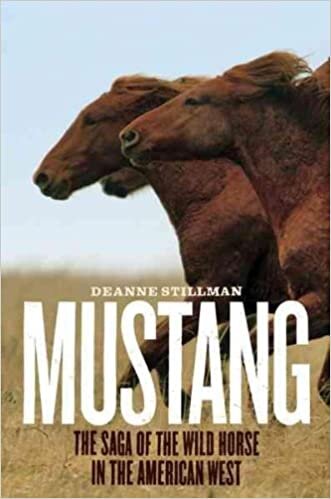The issue surrounding wild horses and burros is complicated and layered. A lot of people don’t even know where to start when it comes to learning about these incredible animals. These are all great books, and we hope you will enjoy them as much as we have.
For the Impassioned
Mustang: The Saga of the Wild Horse in the American West, Deanne Stillman
An epic story that restores the horse to its rightful place in the history of the American West
Mustang is the sweeping story of the wild horse in the culture, history, and popular imagination of the American West. It follows the wild horse from its evolutionary origins on this continent to its return with the conquistadors to its bloody battles on the old frontier to its present plight as it fights for survival on the vanishing range.
Along the way, you meet some of the great characters -- equine and human alike -- in American history, including Comanche, the gallant horse that survived the Battle of the Little Bighorn; Charlie Joe, the intrepid cast member of Buffalo Bill’s Wild West show; Fritz, the mustang that became America’s first equine movie star; and Bugz, the survivor of the 1998 wild horse massacre outside Reno, Nevada. There’s also Wild Horse Annie, who lobbied for the first federal protections for mustangs and, after a twenty-year fight, saw them signed into law in 1971.
In the tradition of Barry Lopez and Peter Matthiessen, Mustang follows the horse tracks across American history and shows that despite ever-encroaching civilization and dwindling protections, the horses still run wild, with spirit unbroken -- a living tableau of our heritage. But for how much longer, no one can say.
For the Historian
Wild Horse Country: The History, Myth, and Future of the Mustang, America's Horse, David Philipps
The wild horse is so ingrained in the American imagination that even those who have never seen one know what it stands for: freedom, independence, the bedrock ideals of the nation. Popularly known as the mustang, the wild horse is the enduring icon of America. But in modern times it has become entangled in controversy and bureaucratic mismanagement, and now its future is imperiled.
In Wild Horse Country, Pulitzer Prize-winning New York Times reporter David Philipps traces the rich history of wild horses in America and investigates the shocking dilemma they face in our own time.
For the Young Person
When 13-year-old Samantha returns home to her family′s cattle ranch in Nevada, she′s worried. She moved away two years ago to recover from a bad fall off her beloved mustang, Blackie, and she′s still not sure she can get back in the saddle. Her new colt doesn′t seem to like her, and the other ranchers treat her like the boss′s spoiled daughter, and Blackie has been missing since that fateful day.
But that′s just the beginning. When Sam suddenly finds the fate of a mysterious mustang - who may or may not be the missing Blackie - resting in her hands, she has to learn to be a real cowgirl, ready or not. The classic theme of a girl and her horse is set against a backdrop of mustangs, tumbleweeds, and a West that′s still Wild.
For the Environmentalist
A hard-hitting look at the battle now raging over the fate of the public lands in the American West--and a plea for the protection of these last wild places
The public lands of the western United States comprise some 450 million acres of grassland, steppe land, canyons, forests, and mountains. It's an American commons, and it is under assault as never before.
Journalist Christopher Ketcham has been documenting the confluence of commercial exploitation and governmental misconduct in this region for over a decade. His revelatory book takes the reader on a journey across these last wild places, to see how capitalism is killing our great commons. Ketcham begins in Utah, revealing the environmental destruction caused by unregulated public lands livestock grazing, and exposing rampant malfeasance in the federal land management agencies, who have been compromised by the profit-driven livestock and energy interests they are supposed to regulate. He then turns to the broad effects of those corrupt politics on wildlife. He tracks the Department of Interior's failure to implement and enforce the Endangered Species Act--including its stark betrayal of protections for the grizzly bear and the sage grouse--and investigates the destructive behavior of U.S. Wildlife Services in their shocking mass slaughter of animals that threaten the livestock industry. Along the way, Ketcham talks with ecologists, biologists, botanists, former government employees, whistleblowers, grassroots environmentalists and other citizens who are fighting to protect the public domain for future generations.
This Land is a colorful muckraking journey--part Edward Abbey, part Upton Sinclair--exposing the rot in American politics that is rapidly leading to the sell-out of our national heritage. The book ends with Ketcham's vision of ecological restoration for the American West: freeing the trampled, denuded ecosystems from the effects of grazing, enforcing the laws already in place to defend biodiversity, allowing the native species of the West to recover under a fully implemented Endangered Species Act.






